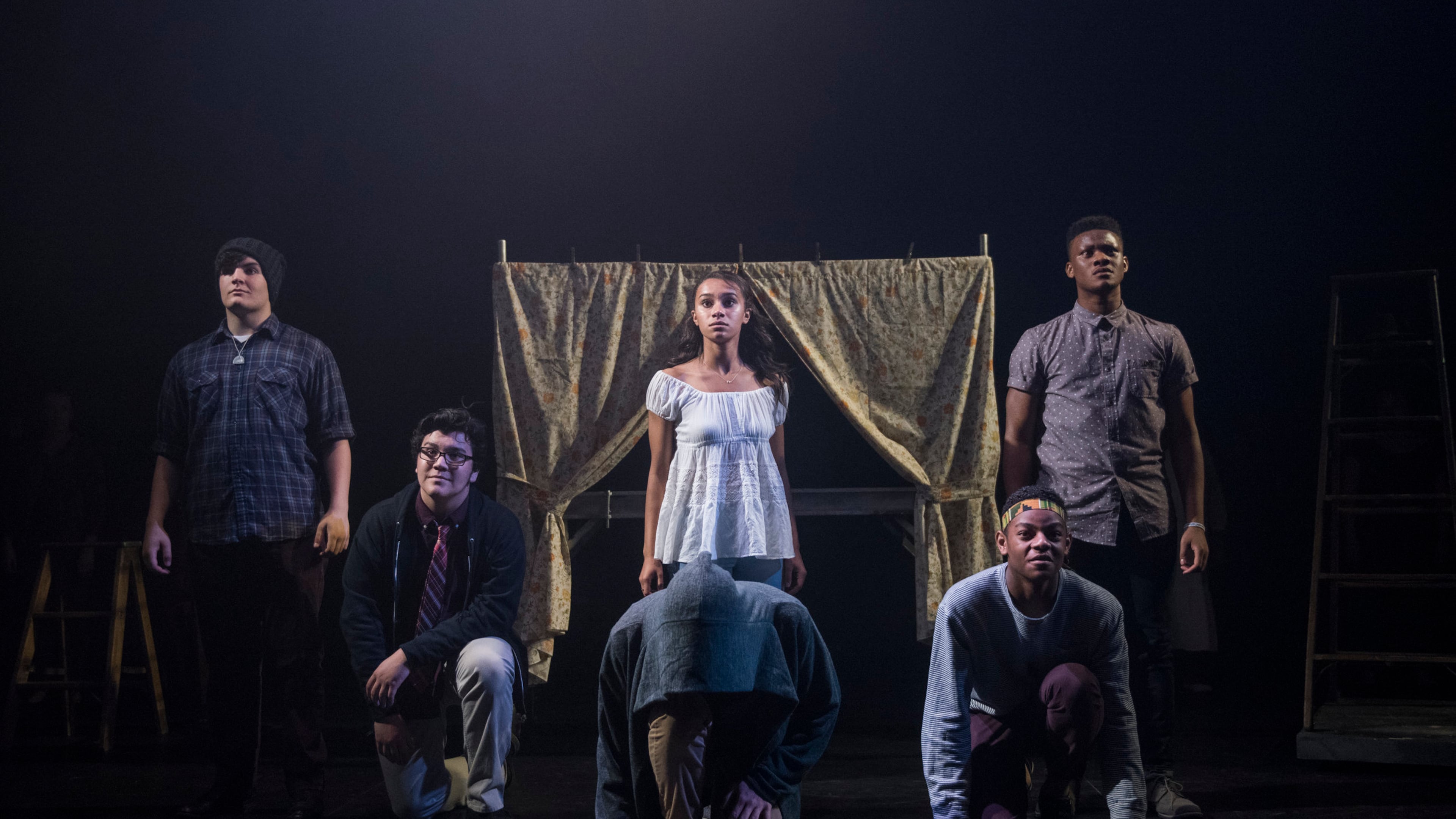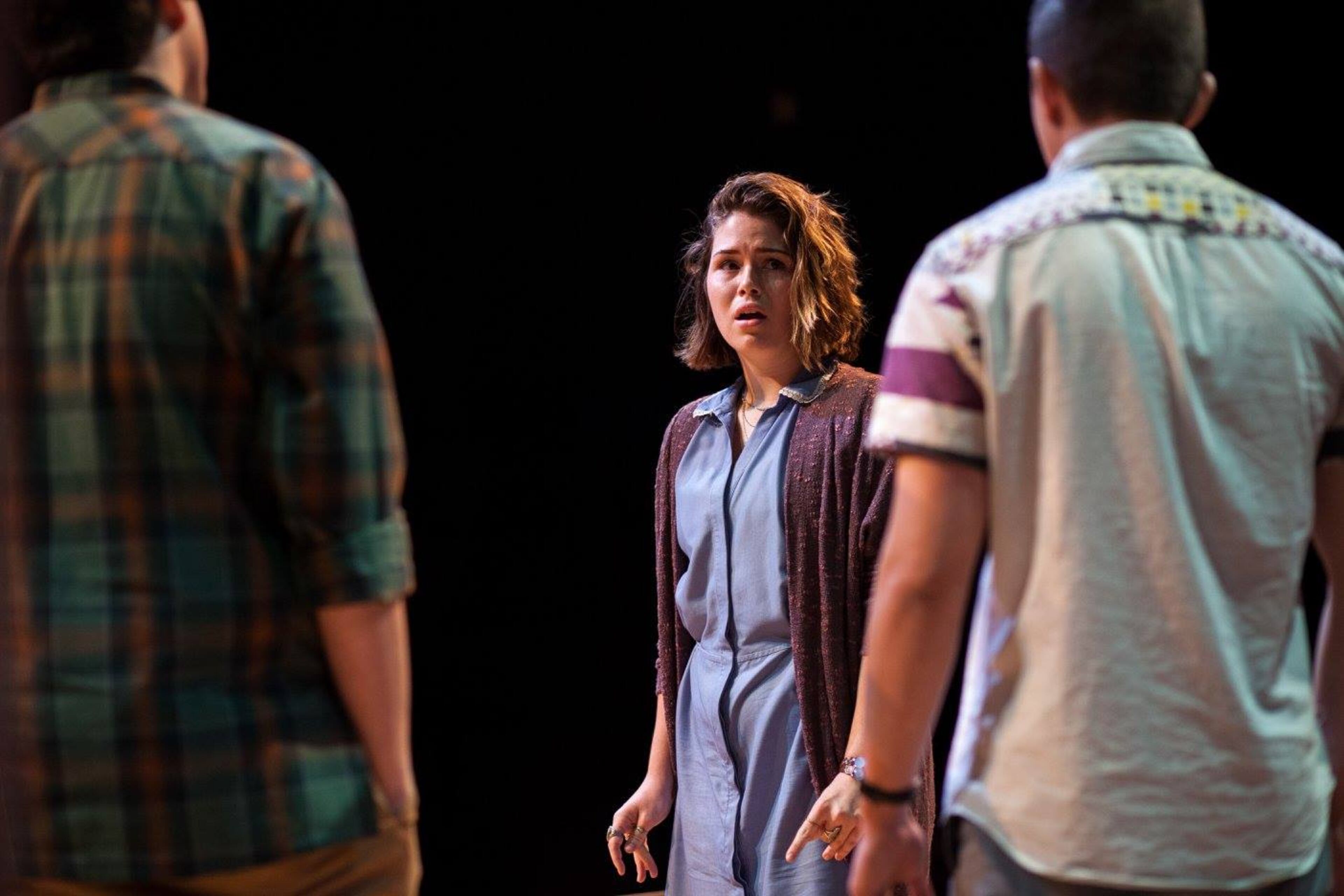‘Lost Girl’ playwright directs Emory production about Wendy post-Neverland

This story was originally published by ArtsATL.
Nostalgia and growth are the driving forces behind “Lost Girl,” a feminist follow-up to J.M. Barrie’s famous tale of Wendy Darling and the boy who never grew up.
It’s appropriate that playwright Kimberly Belflower essentially grew up while she wrote the play, which she began at age 20 and finished nearly 10 years later.
Five years after its initial premiere, Belflower is directing the sold-out play in a new production at Theater Emory through Sunday, Oct. 1.
The play follows a grown-up version of Wendy years after her trip to Neverland. Finding that adulthood pales in comparison to her experiences there, she decides to try to find Peter and take back her kiss, hoping that doing so will allow her to move on with her life. Along the way, she meets a number of other young women with similar stories to hers and realizes that she was not the only girl Peter brought to Neverland.
Since she was young, Belflower has used art as a way of understanding her own life.
“It came out of me experiencing my first heartbreak in college,” said Belflower. “One of my friends told me I had ‘Wendy Darling Syndrome.’ When I asked her what that meant, she said, ‘Well, you’re always trying to save the little lost boy.’”
She had already been drawn to “Peter Pan” as a child, so “Lost Girl” became her way of writing her own self-actualization: “I wrote myself while I wrote the play.”
In “Lost Girl,” the kiss represents a kind of loss of innocence, a piece of yourself that you give to someone else. Therefore, Wendy’s story becomes about trying to reconnect with a part of herself that she feels she has lost. The question at the heart of the play is whether it is possible to reclaim that lost piece, and, if not, how do we learn to go on without it? How can we, as adults, reclaim the lost child versions of ourselves?

One can hardly imagine a better framework to use in this exploration than a story about perpetual childhood — one which many of us first connected with when we were children. The original itself is so steeped in nostalgia that it is easy to conjure up that feeling of yearning for a simpler time.
Today’s audiences are certainly no stranger to this idea; the recent outbreak of reboots and revivals would seem to speak to a collective desire to return to the things that once gave us comfort. However, there is an even deeper historical thread that makes “Peter Pan” the perfect basis for this story.
While doing research for this production, Belflower’s all-student dramaturgy team discovered that around the time “Peter Pan” debuted, society was witnessing the rise of something called “the cult of childhood.”
Prior to the introduction of child labor laws, childhood was not the precious, protected treasure it is now. Most children were expected to begin working from the time they were physically able, whether in factories or local shops or on the family farm. Children were also seen as particularly susceptible to corruption and sin, and therefore childhood was seen as a time to be rushed through on one’s way to becoming an upstanding adult.
However, a major philosophical shift in the mid-18th century led to a more romanticized idea of childhood as a time of innocence and wonder. This shift led many authors, including J.M. Barrie and Lewis C. Carroll, to write works that uplift childhood as something to be longed for. Thus were born Neverland, the Lost Boys and “Peter Pan,” the eternal child.
“Lost Girl” positions itself within a long literary history of works asking the same question: “What does childhood mean to us?” For Barrie, it was a time of wonder and possibility. For Belflower, it is that which must be reconciled in order to move forward.
In trying to reclaim her kiss, Wendy longs to return to the person she was before she met Peter, as if rewriting her past will fix her present. However, what she learns from the other women is that life is about giving pieces of yourself to others and receiving pieces of them in return.
“Lost Girl” had its world premiere in 2018 at Milwaukee Repertory Theatre, where it was praised by Kelsey Lawler of Broadway World Milwaukee as “simultaneously authentic and lyrical.” It had previously been produced at the University of Texas at Austin, where Belflower earned her master of fine arts in playwriting. The play was her application piece and continued to be developed throughout her time at UT Austin. “Lost Girl” earned Belflower the Kennedy Center Darrell Ayers National Playwriting Award in 2018 and has been performed across the country, particularly by high schools and colleges.
This production marks the first time Belflower is taking the helm as director. As a professor of playwriting at Emory University, Belflower also has the benefit of directing her own students.
“About half of the cast are students I have taught and half I haven’t.” From 2019 to 2022, Belflower was an Emory playwriting fellow and is now in her second year as a tenure-track professor.
When asked what she hopes audiences take away from “Lost Girl,” Belflower replied with the same thing she wants of all of her plays: for people to take young women seriously and to look at the stories they hea with new eyes and fresh perspectives.
::
Luke Evans is an Atlanta-based writer, critic and dramaturg. He covers theater for ArtsATL and Broadway World Atlanta and has worked with theaters such as the Alliance, Actor’s Express, Out Front Theatre and Woodstock Arts. He’s a graduate of Oglethorpe University, where he earned his bachelor’s degree, and the University of Houston, where he earned his master’s.

MEET OUR PARTNER
ArtsATL (www.artsatl.org), is a nonprofit organization that plays a critical role in educating and informing audiences about metro Atlanta’s arts and culture. Founded in 2009, ArtsATL’s goal is to help build a sustainable arts community contributing to the economic and cultural health of the city.If you have any questions about this partnership or others, please contact Senior Manager of Partnerships Nicole Williams at nicole.williams@ajc.com.


